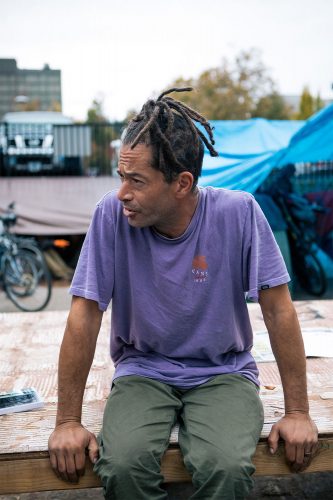
Inscribed on a plaque at the Wayne Morse Free Speech Plaza is a quote from Founding Father Thomas Jefferson: “The will of the people is the only legitimate foundation of any government, and to protect its free expression should be our first object.”
Civil Liberties Defense Center mobilizes Jefferson’s quote in a demurrer filed June 20 challenging the constitutionality of a curfew imposed on Wayne Morse Free Speech Plaza to prohibit overnight camping. The city disagrees with the legal objection, saying the curfew doesn’t infringe the First Amendment or Oregon’s Constitution.
CLDC’s challenge is the fourth time the Eugene-based group has taken the city to court over the constitutionality of imposing a curfew on the plaza and arresting demonstrators who violate the curfew.
This challenge stems from the arrest of homeless advocate Eric Jackson. On Feb. 12, Jackson was arrested and charged with criminal trespass while protesting the criminalization of homelessness by city and county authorities, as well as the plaza’s curfew.
“He was there to challenge the curfew and was trying to draw attention to ICE at the same time,” Lauren Regan, executive director of CLDC, tells Eugene Weekly. “He is a leader and activist in the homeless community.”
In 2012 the Lane County Board of Commissioners amended county administrative rules to impose a curfew on the Free Speech Plaza in response to protesters who had put up tents there. The commissioners’ curfew states that the overnight use of the plaza inevitably leads to camping, leaving the area inhospitable for others.
The city of Eugene, according to its response to CLDC’s challenge filed July 12, agrees with the Lane County Board of Commissioners’ amendment and says a curfew on the plaza doesn’t violate the Oregon Constitution. A curfew doesn’t infringe on free speech because, in this case, Jackson was able to have his protest on the sidewalk, talk to local government or ask Lane County Administrator Steve Mokrohisky for permission to camp in the plaza, according to the city’s filing.
In CLDC’s demurrer, Jackson had no other alternatives for free speech from 11 pm to 6 am since a tent was Jackson’s “symbol of his cause.” The demurrer says there are no other areas near the county government building, and the city of Eugene has eliminated free speech on downtown sidewalks — and blocking downtown sidewalks would pose a safety threat to him and others.
Regan says winning an acquittal for Jackson is a priority but, most importantly, CLDC hopes the city and county will stop violating First Amendment rights for the whole day at the plaza.
In a larger context, she says, spaces to exercise First Amendment rights are shrinking in Eugene. For example, the butterfly lot is closed and public parks have a dusk-to-dawn curfew.
Having the plaza open for two-thirds of a day means that Jackson — and anyone else wanting protest overnight for other reasons — has only two-thirds free speech rights, she says.
“If somebody wanted to have an all-night vigil because of a war, they would be targeted, too,” she adds.
However, the city of Eugene argues the 11 pm to 6 am curfew doesn’t infringe on First Amendment rights because Wayne Morse Free Speech Plaza has been used for numerous rallies, protests and other events.
The city’s response adds that the curfew is necessary to avoid the plaza developing “grossly unsanitary conditions,” which ensures everyone can use the plaza.
CLDC’s demurrer asks the court to see the curfew as an attempt by Lane County and the city of government to limit free speech from those who, like Jackson, protest local government’s treatment of the homeless. In the group’s past constitutional challenges about the closure of the plaza, the court has ruled in favor of the organization every time, Regan says.
In 2013, the group challenged trespassing charges against 15 protesters for violating a curfew imposed at the plaza. In that case, the court ruled in favor of CLDC, claiming that enforcement of a curfew at the plaza, which is similar to a sidewalk, for a third of the day significantly limits a person’s right to speech and assembly.
“The significance of this case, and why we keep willing to litigate these pro bono, is because whenever you have a shrinking of First Amendment rights in the public commons, it is a significant loss to everyone,” Regan says.